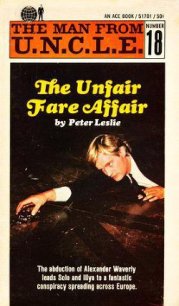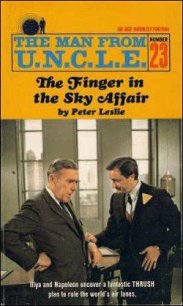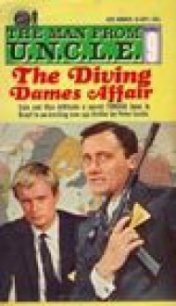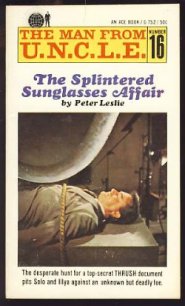The Radioactive Camel Affair - Leslie Peter (читать полные книги онлайн бесплатно .TXT) 📗
A little way to his left, hidden from the men in the cavern by another truck, a doorway opened into the wall. He edged along to it, listened, turned the handle, and slipped through.
He found himself in a long passage with closed doors on either side. Electric bulbs glowed in the roof. At the far end, an opening led to the dark reaches of another cave. The humming noise was louder now: he must be approaching the generating station he had seen from behind the cascades.
Kuryakin flitted silently along the corridor and into the cave. It was empty and unlit—but through it was yet another chamber, in whose dim lighting he could make out the squat shapes of transformers.
He hesitated. Should he conceal himself in this empty cavern, or should he return to the scene of activity and try to hide somewhere there? Perhaps the latter—then he could emerge and investigate further when work had stopped for the day.
He turned. In the lighted entrance to the passage, General Mazzari was standing, a heavy Walther automatic in his hand.
“Not many white rhino down here,” he said mildly. “I think you and I had better have a little talk, old chap…”
Chapter 13
Inside the Underground Fortress
>GANGS OF MEN armed with pneumatic picks were trying to drill off the top of Napoleon Solo’s head before it exploded. They were too late: the world spun away in fragments, leaving a swirling red haze through which the face of the foreman peered at him apologetically.
“… necessary to hit you quite so hard,” the foreman was saying, “but in any case the journey here would probably have caused you more hardship than the blow and its after-effects.”
Solo’s eyes were half open. The foreman’s face sharpened in focus and a room gradually assembled itself behind him. Surely the face was very dark? And for some reason he appeared to be wearing an army uniform of sorts. The room, too, was…unexpected: it seemed to be upside down.
“Who are you?” Napoleon croaked.
“Colonel Ononu, Area Commandant of the Nya Nyerere,” the foreman said. “More to the point, my friend: who are you? And why? And from where? And sent by whom, man?”
Of course, Solo thought. The room wasn’t upside-down at all; he was lying on his back. And yet there was no sense of anything hard, no sign of any floor beneath him. His wrists and ankles hurt like hell. And as the thought formed in his mind, he was astonished to see them in front of him, apparently sticking straight up in the air. He tried to bring them down, failed, saw the pole running between the thongs binding them—and all at once remembered: the deserted glade, the officer with the revolver, the empty Uranium 235 canister, the homing device that had been discovered and used to decoy him into an ambush…
“I said who are you?” the chunky officer repeated.
“I might feel more inclined to reply in a less disadvantageous position,” Solo suggested.
“You are in as happy a position as spies ever are,” the colonel said. “Who are you?”
“I am not a spy. My name is Napoleon Solo. I am engaged on mineralogical research for…a certain government.”
“You are an Arab spy,” the officer said levelly.
“Don’t be ridiculous. How can I be an Arab?”
Ononu slapped his face dispassionately. Pain flamed through the agent’s body as the blow jarred his head.
“How can you not be an Arab?” the soldier sneered.
“I tell you I am a European—”
“Ridiculous. With those hands and fingers? With those teeth?”
“It was a disguise. They can be brought back to normal—”
“And you have even shaved off your beard—see, there’s the outline where the skin is paler.”
Solo was silent. He must have acquired a deeper tan while he was with the caravan, and the removal of the false beard had showed it up. His disguise had been too clever—now it was backfiring on him. “Who…what is the Nya Nyerere?” he asked at last.
“The liberation army of southwest Sudan.”
“Well, it’ll hardly recommend itself to you for its original purpose, but at least it will serve to identify me: there is a laissez-passer in the breast pocket of my shirt, vouching for my bona fides and signed by a high government official.”
Fingers snatched the document from Solo’s pocket.
From his cramped position he took in what he could of the room while it was being read. It seemed to be some sort of office: there were filing cabinets, a desk, charts and maps on the wall. Through a window he could see a steep, tree covered cliff and the corner of a red brick building. From somewhere outside, shouted words of command drifted in. The pole under which he was slung was resting between two banks of steel cabinets.
“This piece of paper is worthless,” a second voice, which Solo had not heard before, said crisply behind him. A man in dark robes walked into his view. It was the stranger he had seen talking to Ahmed at Wadi Elmira and encountered again when he had made his abortive attempt to rejoin the caravan the next day.
“I have myself met Mr. Solo,” the man said contemptuously. “He is a Russian, fair haired, and more slimly built than this man. Did you imagine for one moment, my poor fool,” he continued, gazing down at Solo, “that Thrush would be so naive as to let your clumsy attempts at espionage go undetected? We have been on to you ever since you joined the caravan—only the precise identification of which man was the spy remained. And this you kindly supplied yourself when you tried to join up again after we left Wadi Elmira.”
“And the Uranium 235?” Solo asked, playing for time.
“Was never with this caravan at all. When it was taken away from the first camel train between Casablanca and Alexandria, it was flown straight here by helicopter. Did you think we would be so foolish as to continue with the same system once we knew it had been discovered? Did you think your radio messages from the caravan went unnoticed? We merely let you play your little game so that you could be lured to a place more suitable for your…interrogation. You were meant to discover the canister and follow it.”
The agent said nothing. There was nothing to say.
“And now we come back to the question,” the dark man said. “Who are you and who is employing you?”
Again, Solo remained silent.
“Very well,” the dark man said at length. “As I had feared, we shall have to resort to less polite methods. Colonel?”
Ononu moved back into Solo’s field of vision. He picked up a telephone from the desk and barked a few words into it in a dialect the agent could not identify. Then, dropping the receiver back into its cradle, he walked over and stood looking down at the helpless man.
“Man, you got yourself into some trouble,” he said. “Neither you nor your bosses, whoever they are, can do us any harm now; we’re all set to go…But there’s a Council member arriving today, and he’ll want all the ends tidied up before he comes. So we have to find out all about you, just for the record. We like to know who we’ve beaten, man. You’ll talk, too, sooner or later. Everybody talks. But in your case it has to be sooner, see? Now, why not save us a lot of trouble—and yourself, too—by telling us what we want to know?”
“I have already told you who I am,” Solo said.
The colonel shook his head. He flung out his arms and dropped them to his side again. “I don’t know,” he said. “I don’t know, man.”
There was a knock on the door. “Come in,” the dark man called.
Footsteps crossed the floor behind Solo’s head. “This spy will not say anything,” Colonel Ononu said. “There’s a Council member arriving at six. I want to know before then who he is—who he really is, man—and who sent him, and what’s he doin’ here anyway? Right?…You’d better take him away into the mountain.”




![[The Girl From UNCLE 04] - The Cornish Pixie Affair - Leslie Peter (читать книги полностью без сокращений бесплатно .TXT) 📗](/uploads/posts/books/56865/56865.jpg)